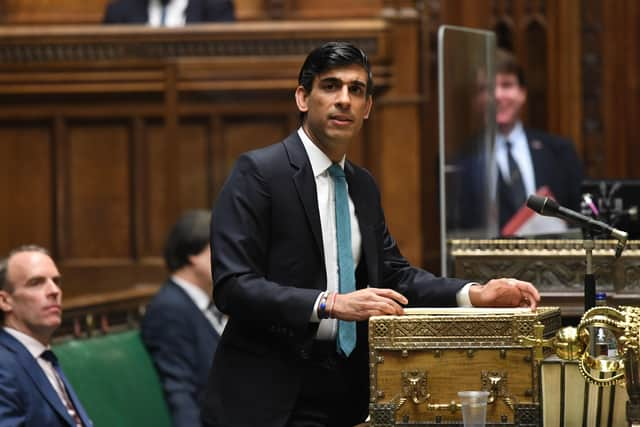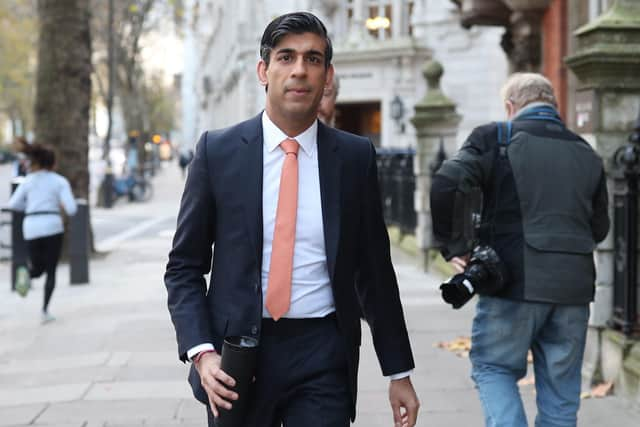Rishi Sunak’s impossible task balancing the books – Bill Carmichael


But after listening this week to Chancellor Rishi Sunak’s candid verdict on the immense lasting damage to the economy caused by the disease, I am beginning to think that perhaps those encouraging glimmers of hope may instead be the lights of a giant freight train thundering our way down the track.
At least the Richmond MP made no attempt to sugar the pill of the chaos caused by the disease.
Advertisement
Hide AdAdvertisement
Hide AdThe adopted Yorkshireman bluntly told MPs in the House of Commons that the economic emergency is only just beginning, with very long lasting damage to growth and jobs.


He said the economy would shrink by more than 11 per cent this year, constituting the biggest economic slump for some 300 years, and is unlikely to return to pre-crisis levels until the end of 2022.
All those green zealots who decry economic growth and demand a “no-growth” strategy are about to find out what exactly that means in practice – and how devastating it will be to the poorest people in the UK and around the world. It isn’t going to be pretty.
For example, joblessness is about to absolutely sky rocket. According to the independent Office for Budget Responsibility, the number of unemployed is expected to surge to 2.6 million by the summer of next year, representing 7.5 per cent of the working population – a level only previously seen in the basket-case of economies of the EU, such as Greece, Italy and Spain.
Advertisement
Hide AdAdvertisement
Hide AdMeanwhile UK borrowing has risen to absolutely terrifying levels. This year we are expected to borrow almost £400bn to pay for economic relief efforts, and the OBR forecasts borrowing to remain above £100bn a year for at least five years.


The national debt will be well over 100 per cent of GDP and has reached more than £2 trillion in total. Never forget when we borrow like this, because we are unwilling or unable to live within our budget, it means that as a country we are, in effect, stealing money from our children, grandchildren and great-grandchildren.
Remember also, this high level of borrowing is only sustainable because interest rates are at historic lows. If interest rates start to move upwards to more normal levels – an inevitable reversion to the mean, as statisticians call it – we are going to find ourselves in even more desperate trouble.
Sunak’s remedies are a bitter pill to swallow, but I honestly do not think he – or more accurately we – had much choice. He announced that 1.3 million public sector workers – excluding NHS staff and those earning less than £24,000 a year – will have their pay frozen next year.
Advertisement
Hide AdAdvertisement
Hide AdThis is a tough decision but unavoidable. At a time when many private sector workers are losing their jobs, how can we possibly justify giving big pay rises to civil servants, many of whom are working from home?
Similarly, the temporary cut in the foreign aid budget is a difficult decision but entirely reasonable, given the dire straits we find ourselves in.
How can we possibly justify borrowing huge amounts of money, and paying interest on it, in order to hand it over to finance the Indian space programme and to teach the Chinese to grow rice?
The truth is much of the utterly ridiculous spending on the foreign aid budget has long been in need of radical reform to ensure the money was actually spent on the neediest.
Advertisement
Hide AdAdvertisement
Hide AdEven after the proposed cut, the UK is still much more generous in terms of foreign aid than most other advanced countries.
We will still be the second biggest donor of aid in the G7 group, streets ahead of countries like France – so please spare me the breast beating about how “mean” the UK is.
After the warming feeling provided by the good news on the vaccine front, the Chancellor’s Commons speech was like being doused with a bucket of freezing cold water.
But let’s not pretend Mr Sunak has not given it to us straight. There is no escaping the horrible truth that the very toughest of hard times lie ahead.
Advertisement
Hide AdAdvertisement
Hide AdSupport The Yorkshire Post and become a subscriber today. Your subscription will help us to continue to bring quality news to the people of Yorkshire. In return, you’ll see fewer ads on site, get free access to our app and receive exclusive members-only offers. Click here to subscribe.
Comment Guidelines
National World encourages reader discussion on our stories. User feedback, insights and back-and-forth exchanges add a rich layer of context to reporting. Please review our Community Guidelines before commenting.